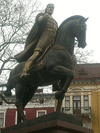Danilo (Daniel) Romanovich – Prince of Galicia and Volhynia

Danilo (Daniel) Romanovich
Known as Danilo of Galicia (Danylo Halytskyi, Данило Галицький), he ruled the Principality of Galicia-Volhynia (Ruthenia)(now in Poland and the Ukraine, respectively)—at that time, one of the most influential states of East-Central Europe.
Son of Prince Roman Mstislavich, Daniel was only four years old when his father—who had united Galicia and Volhynia—died in battle against the Poles in 1205. Not until 1221 did Daniel begin to defeat other claimants to Roman’s succession and assert his authority over Volhynia, and only in 1238 did he finally gain control of Galicia. He then focused on enriching his domain, encouraging settlers, building cities (including Lvov and Chelm), and promoting the development of flourishing trade throughout his lands.
Following the devastating Mongol invasions of 1240–41, Danilo recognized the Mongol khan’s authority to protect his people, but he preserved considerable autonomy and worked to strengthen his principality. He sought alliances with Hungary, Poland, Austria, and Lithuania—marrying his children into European royal families and negotiating with the Pope to seek military support against the Mongols.
In 1253, Danilo was crowned the first and only King of Rus’/Ruthenia (Rex Russiae) by a papal legate, hoping to unite Christian resistance. Although military aid from Europe never arrived, he temporarily drove the Mongols out of Volhynia, but by 1260 renewed invasions forced him to submit and dismantle his defenses. Danilo spent his later years balancing vassalage to the khan with preserving Rus’ traditions and self-rule.
- Founder of Lvov (now Lviv), named for his son Lev
- Crowned King of Ruthenia (1253)
- Last ruler to establish a strong, independent Rus’ state, which maintained its autonomy under Mongol suzerainty and continued for nearly a century after his death, before eventual Polish and Lithuanian conquest.
Names and Titles Used for Daniel Romanovich
| Name / Title | Language / Source | Meaning or Context |
|---|---|---|
| Данило Романович (Danilo Romanovich) |
Old East Slavic (Ruthenian Chronicles) |
Personal name and patronymic; used by himself and in official records. |
| Князь Данило (Knyaz Danilo) |
Old East Slavic | "Prince Danilo"; standard princely title in Rus’ lands. |
| Князь Галицкий (Knyaz Galitsky) |
Old East Slavic / Later Chroniclers | "Prince of Galicia"; highlighting his rule over Halych (Galicia). |
| Данило, король Руси (Danilo, korol' Rusi) |
Old East Slavic | "Danilo, King of Rus’"; used after his papal coronation in 1253. |
| Rex Russiae | Latin (Papal/Western sources) | "King of Ruthenia/Rus’"; official Latin title in Western diplomatic correspondence. |
| Daniel, King of Galicia and Volhynia | Latin (Polish/Hungarian records) | Title used in some foreign and later sources to specify his realm. |
| Данило Галицький (Danylo Halytskyi) |
Modern Ukrainian | Main modern Ukrainian form; emphasizes his connection to Halych (Galicia). |
| Данило Романович (Danylo Romanovych) |
Modern Ukrainian | Also used in modern Ukrainian scholarship and literature. |
| Даниил Галицкий (Daniil Galitsky) |
Modern Russian | Standard Russian form; common in Russian historical writing. |
| Даниил Романович (Daniil Romanovich) |
Modern Russian | Also used in modern Russian scholarship. |
| Daniel of Galicia | Modern English / Western | Most common form in English-language and Western sources; specifies region. |
| Daniel Romanovich / Danylo Romanovych | Modern English / Western | Used in English-language scholarship, sometimes with the patronymic for clarity. |
| King of Ruthenia / Rex Russiae | Modern English / Western | Refers to his royal coronation and title in diplomatic contexts. |
The city’s many names: Lvov, Lwów, Lemberg,
Lviv
Explore the historical evolution of the names of Lviv (Lvov, Lwów, Lemberg, Leopolis) with
context for
each era, from its Rus’ origins through Polish, Austrian, Soviet, and Ukrainian periods.
Galicia-Volhynia
History: Origins According to the Chronicles
If you want to see how Galicia grew out of Kievan Rus’, and learn about its early rulers and
names, this is the place to start!
Galician Cities and Towns
(Austro-Hungarian Empire)
Use this page to find your family’s ancestral town in Galicia, even if the name is unfamiliar,
misspelled, or in another language. This detailed table shows each town’s main names—German,
Polish,
Ukrainian, Yiddish, Russian, and current names—helping you connect records across borders and
centuries.